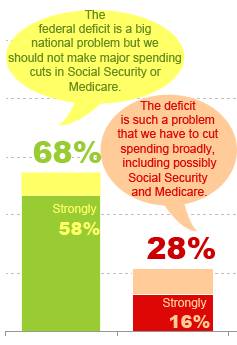In poll after poll, the American people of all ages and political persuasions continue to send Washington a clear message?cutting Social Security in the name of deficit reduction is not ?fiscal responsibility?.Thelatest research survey on investment and deficit reduction was done by Greenberg Quinlan Rosner commissioned by the Campaign for America?s Future and Democracy Corps, with support from MoveOn.org; the American Federation of State, County and Municipal employees, and the Service Employees International Union.They describe their findings this way: ?Voters are united on this key point: Social Security and Medicare are off-limits as a way to reduce the deficit. It is the threat to Social Security that leads many voters to prioritize deficit reductions. Voters instead want to see higher taxes on top income earners and big corporations.As Social Security celebrates its 75th anniversary this week in the midst of this troubled economy, voters across the political divide want these programs defended.68 percent said they would oppose making major spending cuts in Social Security and Medicare to reduce the deficit, while 28 percent said they would favor cutting those programs. That included 61 percent of Republicans and 56 percent of independents.Strong majorities support progressive solutions for addressing the federal deficit: 63 percent back lifting the Social Security cap on incomes higher than $107,000 a year; 64 percent would favor eliminating tax breaks for corporations that outsource jobs; 62 percent would support a tax on excessive Wall Street bank profits.“These results mirror results of our National Committee Foundation poll conducted earlier this summer in which only 2% of Americans believe Social Security is a major cause of the deficit with 77% opposing any changes in Social Security as part of a deficit reduction plan.Theye also echo what Americans told AARP in another recent poll in which 85 percent of adults oppose cutting Social Security to reduce the deficit; 72 percent “strongly oppose” doing so.It?s clear the Washington Disconnect between working Americans and policy makers on the issue of Social Security couldn?t be larger.
?Voters are united on this key point: Social Security and Medicare are off-limits as a way to reduce the deficit. It is the threat to Social Security that leads many voters to prioritize deficit reductions. Voters instead want to see higher taxes on top income earners and big corporations.As Social Security celebrates its 75th anniversary this week in the midst of this troubled economy, voters across the political divide want these programs defended.68 percent said they would oppose making major spending cuts in Social Security and Medicare to reduce the deficit, while 28 percent said they would favor cutting those programs. That included 61 percent of Republicans and 56 percent of independents.Strong majorities support progressive solutions for addressing the federal deficit: 63 percent back lifting the Social Security cap on incomes higher than $107,000 a year; 64 percent would favor eliminating tax breaks for corporations that outsource jobs; 62 percent would support a tax on excessive Wall Street bank profits.“These results mirror results of our National Committee Foundation poll conducted earlier this summer in which only 2% of Americans believe Social Security is a major cause of the deficit with 77% opposing any changes in Social Security as part of a deficit reduction plan.Theye also echo what Americans told AARP in another recent poll in which 85 percent of adults oppose cutting Social Security to reduce the deficit; 72 percent “strongly oppose” doing so.It?s clear the Washington Disconnect between working Americans and policy makers on the issue of Social Security couldn?t be larger.


